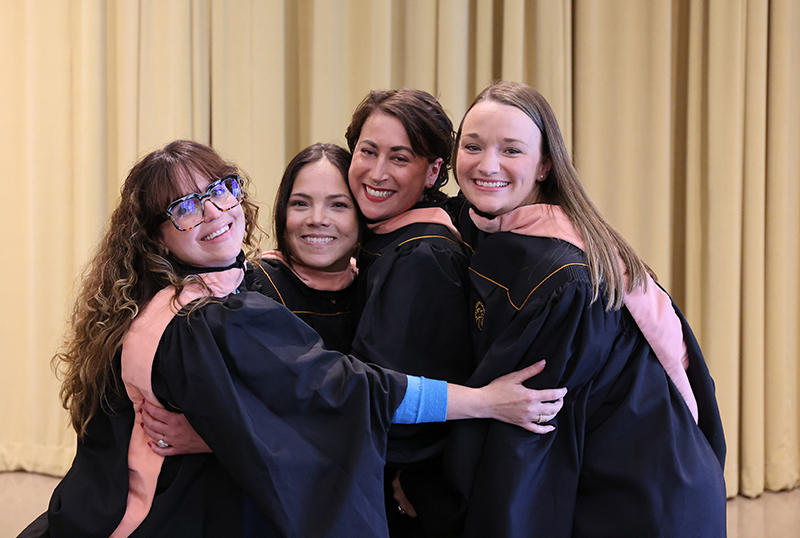Purdue student seeks to address stigmas around aging and caretaking with MHA degree
Written By: Rachel Barton

Lisa Sheeley (left) poses with some of her fellow MHA graduates. (Photo provided)
Purdue University online Master of Health Administration (MHA) graduate Lisa Sheeley is excited to grow old. Since her time as an undergraduate in the late 2000s, she’s been thinking about aging — why people are afraid of it and what effect that fear has on our lives. These questions motivated her to start a career in health care nearly 15 years ago and eventually brought her back to Purdue to pursue her master’s degree.
“Aging is a privilege,” Sheeley said. “There’s stigma attached to the help older people need in their day-to-day lives, like needing a caretaker. But helping someone take care of their daily needs is also a privilege — there’s no shame in giving or receiving help.”
Sheeley knows about the privilege of caretaking firsthand. After graduating with a bachelor’s degree in sociology from Purdue in 2009, she worked with older adults in long-term care, home health care, and nonprofit settings. Helping these individuals access the care they need is something she feels passionate about.
“My interest in elder care started in college,” Sheeley said. “I took every geriatric or aging-related class I could find — I thought it was interesting. Even though aging is something that happens to everyone, it’s not easy for people to confront, and there’s a lot of work to do in terms of changing people’s attitudes about it.”
A few years after Sheeley started working in the elder care field, she began thinking about going back to school to earn her master’s degree. However, she kept that plan on the backburner until the pandemic hit in 2020 and she found herself working from home for the first time. With her daily commute out of the picture, she suddenly had more free time.
As a Purdue alumna, Sheeley had always envisioned herself going back to Purdue for her master’s education, but she needed something entirely online so she could work and study at the same time. When she found out Purdue was starting a new online MHA program, it seemed like fate.
“That sealed the deal — I didn’t even look at other programs,” Sheeley said. “It just fit perfectly.”
Sheeley was part of Purdue’s first online MHA cohort, and so she and her classmates got to play the part of trailblazers, testing out the online material and setting precedents for future cohorts. Even though this was Sheeley’s first time pursuing a degree online, the transition was seamless. She said she enjoyed the flexibility of her online classes and found her coursework interesting.
Many of her classes focused on studying health care disparities between different populations, including older populations. Learning about the lack of equity in health care touched Sheeley’s heart, and it confirmed how much of an impact health care workers can make on their patients’ lives.
“We learned about how not having access to health care can negatively affect one’s health and even future generations of their family,” Sheeley said. “That was really eye-opening.”
Over the course of the program, Sheeley also developed close relationships with her cohort, including Karrah Teruya and Suesan Coleman. When they weren’t working on projects, they talked with each other over a group chat they named the “Boilermaker Queens,” sharing updates about their lives and swapping notes about the program. According to Sheeley, these friendships sustained her throughout her graduate school journey and have become a huge feature of her life today.
Now that Sheeley has graduated, she’s looking toward the future and considering how she can make a lasting, positive impact on the health care industry. Her years of experience working with older patients have given her a nuanced perspective on aging, and she hopes she can make aging something that people look forward to.
“My biggest goal is to change the way people think about places like nursing homes and other spaces dedicated to taking care of the elderly,” Sheeley said. “It’s important that elderly people don’t think of care facilities as a death sentence. Changing people’s perception of needing care later in life can make the whole process of aging a lot less scary.”
For more information about Purdue’s online MHA, including how to apply, please visit the program’s webpage.